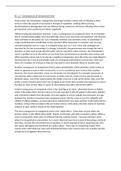AC 1.3 - Consequences of Unreported Crime
Many crimes are unreported, ranging from seemingly harmless crimes such as littering to more
serious crimes like assault or harassment. Changes in legislation, existing offences being
decriminalised or downgraded and new offences being created are all factors affecting what crimes
get reported, some positively and others negatively.
Offences being decriminalised, however, is also a consequence of unreported crime. As an example,
due to cannabis being widely used recreationally, there is not much fear surrounding it, and because
many members of the public see it as a relatively harmless and victimless crime, its possession or
usage would therefore would likely not be reported. When behaviour is accepted, such as using
cannabis being the norm to many, it is stopped being seen as a ‘real’ crime and campaigns are
launched for the law surrounding it to change. Eventually, the government may change the law in
question, as they must accept that the public will not report the crime anymore. Decriminalisation
can be a positive as it can the police can use their time and resources on possibly more serious and
effort-requiring crimes, but it can also be a negative consequence since the crime was made illegal in
the first place for a reason and people could use it being decriminalised to commit the crime even
more. For example, an increase in drug use may lead to more domestic abuse or assault cases.
Another consequence of unreported crime is police prioritisation. Police prioritise certain crimes in
order to appease a local or wider community, or as it is considered more serious than another.
However, this means that other crimes are inevitably not investigated. For example, possession of
cannabis has taken a back seat in recent years to make room for crimes such as sexual assault or
domestic abuse, one of the reasons being the media’s focus on it and call for action. Also, once the
public is aware that the police won't act in regard to the crime they consider less important or aren’t
focusing on, they are less likely to report as they believe the police will not deal with it.
A third consequence of unreported crime is the ‘dark figure of crime,’ otherwise known as hidden
crime. If the police don’t record a crime or it is not reported, it will not appear in the police statistics
and is therefore hidden from the public. This also applies to crimes nobody has witnessed. The gap
between the number of reported and unreported crimes calls for concern over the reliability and
validity of official statistics, as each police force submits their own data and they could easily edit the
numbers. Crimes often included in this are human slavery, child abuse and male victims of domestic
violence or rape, which is known to be underreported.
The next consequence of unreported crime is the ‘ripple effect.’ Crime does not just affect the
primary victim, it also affects their family, friends, community, and other secondary victims. When a
crime is unreported, those who are affected feel that nothing is done – because nothing is done
when it is unreported or unrecorded. As a result, they feel even more scared of becoming a victim of
all crimes, not just the unrecorded one in question. A recent example of this is Sarah Everard, who
was raped, kidnapped and murdered by a police officer. There was an outpouring of grief from
women who could relate her story and remembered those who’s stories were not as public and did
not get the investigation they deserved.





